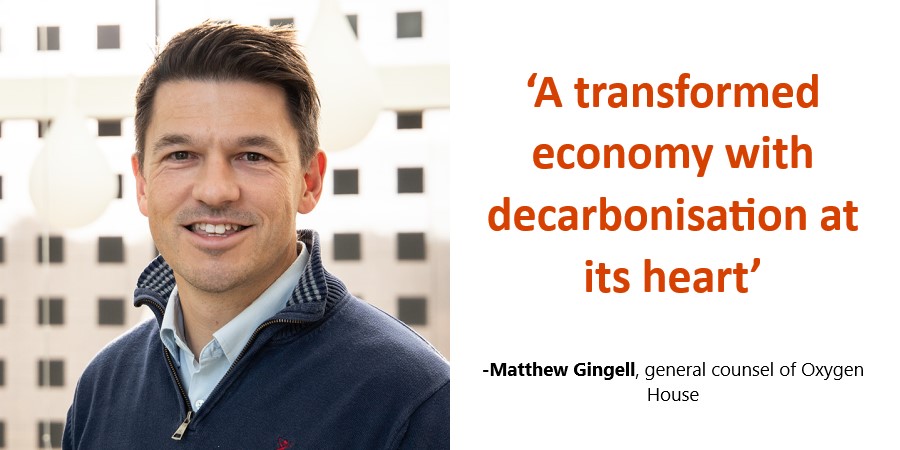
Matthew Gingell, general counsel of Oxygen House, established The Chancery Lane Project in 2019 with the aim of promoting significant advancements in decarbonisation through the integration of climate protection measures into international commercial agreements. In an interview with ALB, Gingell discusses his efforts to drive positive change within the legal industry in terms of environmental impact, as well as his vision for the future of the project.
ALB: Where do decarbonisation and legal work intersect, and how are you looking to make use of it?
Matthew Gingell, founder and chair of The Chancery Lane Project: There are four legal levers that intersect decarbonisation and the law. Climate Laws, Climate Litigation, Climate Governance and Climate Contracts. Laws and Litigation take significant time, which we do not have.
The Chancery Lane Project supports businesses to decarbonise using their contracts. Our open-source content includes eight guides, a glossary of climate-defined terms and a library of core clauses that support lawyers and other business professionals. We want to ensure that the contracts being written today protect the world of tomorrow.
We believe that if the legal community changes how it manages contracts with respect to reducing emissions, the result will be a transformed economy with decarbonisation at its heart. The legal community is just 1 percent of the economy, but it governs the other 99 percent. The law is a vital component of change across markets.
When we speak to companies, they tell us that climate change poses a significant risk to their business, not just in terms of the impact it can have on future profits, but also in terms of preparing for incoming regulation. Our content helps businesses mitigate that risk, which is why the Law Society, International Bar Association, and various other industry guidelines and toolkits recommend climate contracting as a way of meeting net-zero targets.
ALB: The project's Malaysian chapter was recently established. What are the plans for it?
Gingell: We’re proud of the fact that our content has motivated lawyers internationally. Across the world, we’ve worked with lawyers to transpose our content for their jurisdictions. We have transposition teams across Asia, including Japan, China, Singapore, Hong Kong, India, and Pakistan. Malaysia is the latest of our transposition teams to be set up, and we are excited to see what business professionals will do with the transposed content.
We’re in the process of trialling publishing international content, so watch this space.
ALB: How would you evaluate the appetite for decarbonisation efforts within the legal community, and how do you plan to raise awareness further?
Gingell: There is a range across different jurisdictions. During the course of our work in Europe, we’ve observed a market shift away from lawyers merely being climate conscious to recognising that it is impossible to give trusted and competent advice to clients without considering climate risk. This is evident in the Law Society of England and Wales climate change guidance, for example, which other law societies and bar associations globally may replicate.
Responding to elements of the Law Society’s guidance, I published a whitepaper in September 2023 as general counsel of the Oxygen House Group, proposing an innovative approach for lawyers on advised emissions (being the impact of the advice given, rather than the operational footprint of the firm). The paper reflected a growing understanding that climate change is the responsibility of business and law to address as much as it is that of governments and civil society.
In terms of raising further awareness, our guides support lawyers and other business professionals in using climate contracting in their companies. The guides are a way to help lawyers and other professionals create the right conditions for climate clauses to be used by their clients and companies; they are also a gateway for raising awareness of the principles of reducing emissions via contracts.
ALB: How is TCLP planning to harness the power of emerging technologies in advancing its purpose and goal?
Gingell: We have two areas we’re focussing on at the moment. First, we are making sure our content is used in training data. With the growing popularity of Large Language Models (LLMs), we’ve quickly realised that we’re the centre of the most valuable and difficult part of the data ecosystem; the creation of quality reliable content. AI companies are currently fighting over this to use as training data, so we’re making sure it’s easily available to them. If our content is informing these data sets, the potential is huge.
The second is finding opportunities for climate-aligned clauses. With the help of a data scientist, we’re soon going to explore how we can use LLMs to review huge, publicly accessible repositories of contracts and spot opportunities for climate-aligned clauses, for example, in public sector contracts. We can then look at the length and value of these contracts and determine engagement activities to help the department implement the right clauses.


